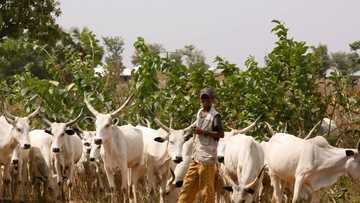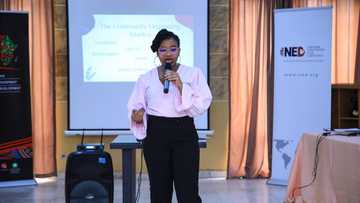How Traditional Leader Curbs Gender-Based Violence in Abuja Community
- An Abuja community has continued to work towards ending all forms of gender-based violence among its residents
- The traditional leader of the community said he uses various approaches to stem possible triggers of gender-based violence among members of Galadimawa community
- According to the traditional leader, sensitization of residents of the community has been key to identifying early warning signs of GBV
PAY ATTENTION: Click “See First” under the “Following” tab to see Legit.ng News on your Facebook News Feed!
FCT, Abuja - As Nigeria and various agencies - both local and international - continue with the drive to end gender-based violence in the country, traditional leaders are not left behind in campaigns to ensure a violence-free nation.
In his contribution to ending gender-based violence, the Esu of Galadimawa Community, Abuja, His Royal Highness Tanko Zhamiko reeled out efforts made by himself and his council members.
Speaking during a visit by the Spotlight Initiative team in partnership with the European Union, the National Orientation Agency and the Child Rights Information Bureau of Information at the ministry of information, culture and tourism, Zhamiko said gender-based violence is a menace that has eaten deep into every system.
GBV popularly referred to as violence against women and girls is a global pandemic that affects one in three women in their lifetime.
The United Nations Children’s Emergency Fund (UNICEF) said despite the verifiable fact that GBV undermines the health dignity, anatomy of its victims, there is a high number of cases concealed in a culture of silence.
A UNICEF’s child protection officer, Tochi Odele, had warned that GBV usually occurs in a trusted environment and the crime perpetrated mostly by trusted individuals – family members, caregivers, people usually held in high esteem among others.
PAY ATTENTION: Join Legit.ng Telegram channel! Never miss important updates!
Odele said the biggest challenge of ending the menace of GBV is that people do not believe the stories of victims and most times perpetrators are shielded from facing justice, leaving survivors to face discrimination from community and family members.
Consistent Sensitisation of the People of Galadimawa
However, in his push to ensure that no resident of the Galadimawa community is abused or violated either physically, mentally, sexually or otherwise, Zhamiko said he established a team of council members whose tasks including sensitizing the people of the dangers of GBV and identifying early warning signs of GBV.
Zhamiko noted that the members of the community are constantly informed about the need to always speak up and speak out in the face of any form of abuse or violence.
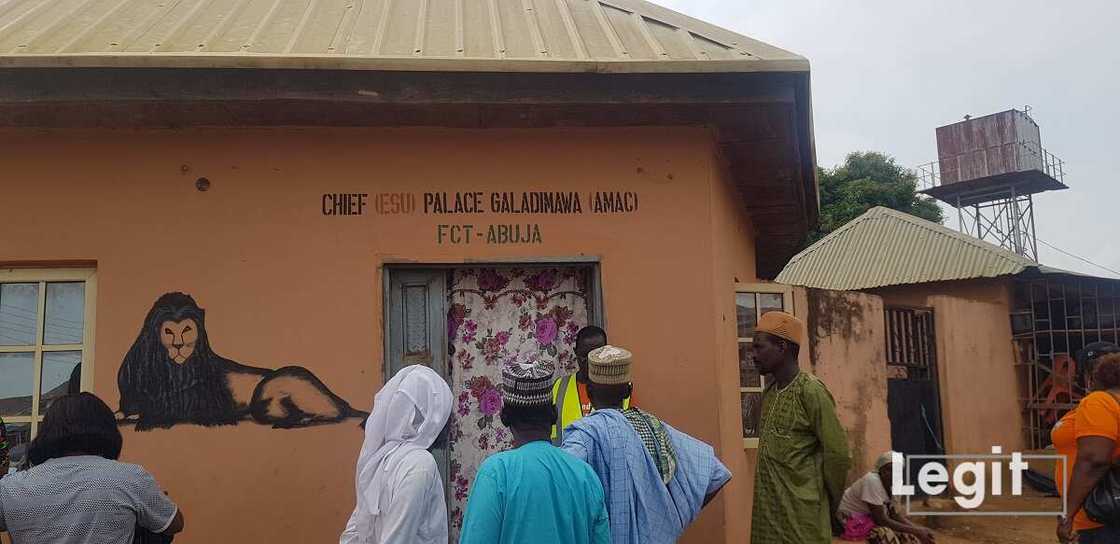
Source: Original
He also noted that as a duty, he always tells his people to feel free to report to him or any member of his should there be a case of perceived violence against women, children or even the male gender in their homes or community at large.
He said:
“To discuss various issues that affect the community and we advise them never to take laws into their hands but reports incidents that could lead to gender-based violence to me or my council members.”
"We also use various sensitisation methods through churches or mosques to bring peace and stability in our community."
Women as Agents of Change
Noting that some issues are better discussed among the same gender and handled better by a woman, Zhamiko said he also ensured that women are an integral part of his cabinet for easy flow and handling of cases of GBV.
The traditional leader said:
“We also have women as part of my council members, in some cases depending on what happened, I refer them to the women to handle them better. This is because there is some issue, they might not want to discuss with a man but can easily open up to women.”

Read also
You have failed Nigerians, minority Reps fumes, tasks Buhari on planned strike by airline operators
“So, when I figure out that this is the case, I call on the women among my council members to handle it.”
Collaborating the traditional leader’s approach to ending GBV, Asabe Zhamiko, who is the woman leader at Galadimawa community and doubles as a member of the traditional leader’s council said since they embarked on sensitisation campaign against GBV, various types of abuses especially of husbands beating their wives have become a history.
Asabe said no culture not even in Galadimawa forbids women from reporting issues of violence or abuse by their husbands and vice versa.
She said:
“No culture in the community forbids women reporting their husbands, if such report ever existed the women are at liberty to report the abuse to the leaders, and actions are taken immediately.”
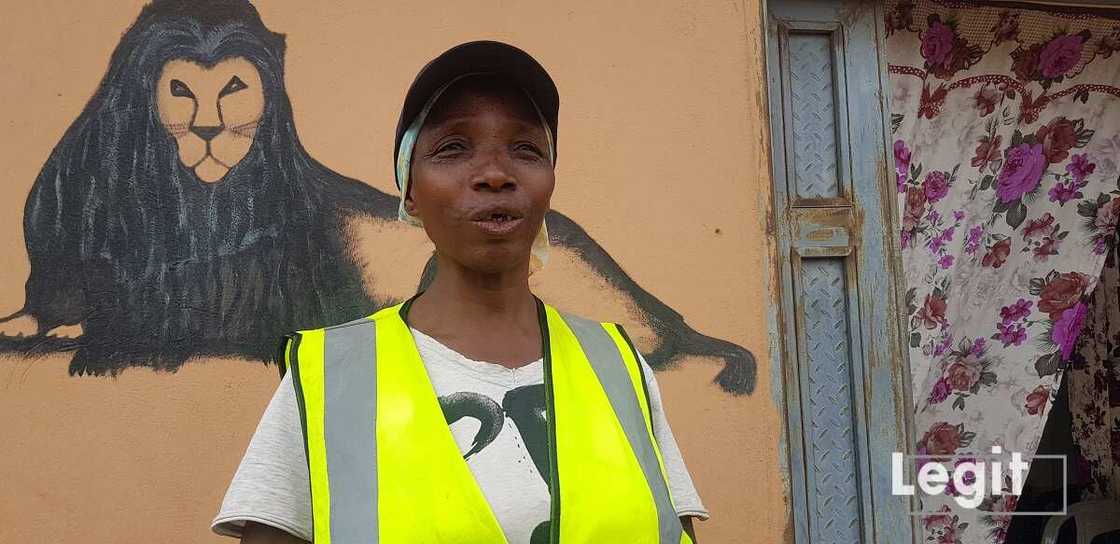
Source: Original
Continuing, the traditional leader said actions are immediately against perpetrators of GBV.
According to Zhamiko members of the council are saddled with the responsibility to report back to him whenever there is a case that cannot be handled by them for further action.
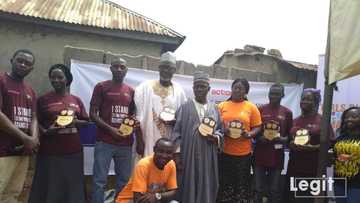
Read also
Traditional leader, son, 5 others bag awards for standing against gender-Based Violence in Abuja community
Zhamiko said:
“That has been in the system even before I can to board as the village head of this community. Most importantly, the cooperation I am getting from the various ethnic group that are resident here is overwhelming.”
“In fact, I also appointed some of their leaders to help in checkmating some of the violence against women and children.”
“And not only that, as I said, we also use various churches through their pastors to make they sensitise their congregation during their preaching on the dangers of domestic and gender-based violence.”
He said he desires for the Galadimawa community to remain the most peaceful and violence-free place to reside.
He said:
“Even though we cannot run away from some of all these things that may come to be because no matter the efforts you're making you'll still have some bad element living among the populace.
"But as I said, with the help of our forefathers and through our religious beliefs, some of these things have been reduced to a minimum level."
He said the council members on daily basis go round their domains of assignment to ensure cases of spousal abuse does not escalate.
The traditional leader added:
"We had an issue, some weeks ago, a woman reported her condition to me. About what she was passing through in the hands of her husband.
“Immediately, I summoned my number 2, that is Madaki, to handle the matter and at the conclusion to report back to me. And immediately he took action invited the husband and the wife, and thereafter he gave them the advice to go back to their parents who were in the best position to handle that particular matter."
Although the chief would not specifically state what the issue between the couple was at the time, he said the couple are currently living in peace and harmony.
A joyful Zhamiko said:
"They both recently came to me to thank me and my cabinet for sustaining their relationship and marriage."

Read also
Who my successor will be - Buhari speaks to Nigerians in first tweet after lifting Twitter suspension
Legit.ng had previously reported that Ibrahim Sesay, the chief child protector for UNICEF urged media organisations and journalists to partner with relevant agencies on issues surrounding men and girls in Nigeria.
Sesay said funds have been committed globally towards curbing all forms of violence against women and girls.
He also called for a conscious effort to protect victims of GBV violence in every media reporting involving women, girls and children.
In other news, as part of the stakeholders involved in improving the wellbeing of women and girls, the governor of Enugu state, Ifeanyi Ugwuanyi has been commended.
Ugwuanyi was commended alongside his wife for the steadfast commitment to the life of the girl child.
Source: Legit.ng


